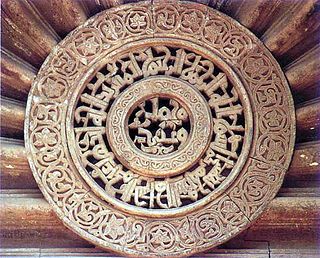Ayatollah is an honorific title for high-ranking Twelver Shia clergy in Iran and Iraq that came into widespread usage in the 20th century.

Seyyed Hossein Nasr is an Iranian philosopher and University Professor of Islamic studies at George Washington University.
Henry Corbin was a French philosopher, theologian, and Iranologist, professor of Islamic studies at the École pratique des hautes études. He was influential in extending the modern study of traditional Islamic philosophy from early falsafa to later and "mystical" figures such as Suhrawardi, Ibn Arabi, and Mulla Sadra Shirazi.
Usulis are the majority Twelver Shi'a Muslim group. They differ from their now much smaller rival Akhbari group in favoring the use of ijtihad in the creation of new rules of fiqh; in assessing hadith to exclude traditions they believe unreliable; and in considering it obligatory to obey a mujtahid when seeking to determine Islamically correct behavior.

Welayah or Walaya is a general concept of the Islamic faith and a key word in Shia Islam that refers, among other things, to the nature and function of the Imamate.

‘Iṣmah or ‘Isma is the concept of incorruptible innocence, immunity from sin, or moral infallibility in Islamic theology, and which is especially prominent in Shia Islam. In Shia theology, ismah is characteristic of prophets, imams, and angels. When attributed to human beings, ismah means "the ability of avoiding acts of disobedience, in spite of having the power to commit them". Along with a pure constitution, excellent qualities, firmness against opponents, and tranquility (as-Sakinah), ismah is a divine grace bestowed by God.

Vali Reza Nasr is an Iranian-American academic and author, specializing in the Middle East and the Islamic world. He is Majid Khaddouri Professor of International Affairs and Middle East Studies at the Johns Hopkins School of Advanced International Studies (SAIS) in Washington, D.C. He served as the eighth dean of the school from 2012 to 2019. Nasr is also a Non-Resident Fellow in South Asia at Atlantic Council and is described by The Economist as "a leading world authority on Shia Islam".
Minhaj as-Sunnah an-Nabawiyyah is a work by Ibn Taymiyyah. It was written as a refutation of a book by the Shi'a-Ithna'ashari theologian Al-Hilli called Minhaj al-karamah.

The Fourteen Infallibles in Twelver Shia Islam are the Islamic prophet Muhammad, his daughter Fatima Zahra, and the Twelve Imams. All are considered to be infallible under the theological concept of Ismah. Accordingly, they have the power to commit sin but by their nature are able to avoid doing so, which is regarded as a miraculous gift from God. The Infallibles are believed to follow only God's desire in their actions because of their supreme righteousness, consciousness, and love for God. They are also regarded as being immune to error in practical matters, in calling people to religion, and in the perception of divine knowledge. Some Twelver Shia believe the Fourteen Infallibles are superior to the rest of creation and to the other major prophets.

Shaykh Tusi, full name Abu Jafar Muhammad Ibn Hassan Tusi, known as Shaykh al-Taʾifah was a prominent Persian scholar of the Twelver school of Shia Islam. He was known as the "sheikh of the sect ", author of two of the four main Shi'i books of hadith, Tahdhib al-Ahkam and al-Istibsar, and is believed to have founded the hawza. He is also the founder of Shia jurisprudence.

Twelver Shīʿīsm, also known as Imāmīyyah, is the largest branch of Shīʿa Islam, comprising about 85 percent of all Shīʿa Muslims. The term Twelver refers to its adherents' belief in twelve divinely ordained leaders, known as the Twelve Imams, and their belief that the last Imam, Imam al-Mahdi, lives in Occultation and will reappear as The promised Mahdi. According to the Shīʿa tradition, the Mahdi's tenure will coincide with the Second Coming of Jesus (ʿĪsā), who, along with Mahdi, would kill the Dajjal.
Badā' is a Twelver Shia Islamic concept regarding the Will of God. It refers to God revealing his will about a decision, wherein the people thought his will had already been made on that issue, as the Shia believe that God has knowledge of the ultimate outcome.
Syed Mohammad Waris Hasan Naqvi was a Shia muslim cleric from Lucknow, Uttar Pradesh, India.
Mazlum (maẓlūm) is an Arabic term for "oppressed, ill-treated, injured, sinned-against".

Mohammad Bagher Shafti, also known as Rashti and Bidabadi, was an Iranian shia clergyman. The Seyyed mosque in Isfahan was built by him. According to Hossein Nasr and Hamid Dabashi, he is probably the first clergyman, who was titled as Hujjat al-Islam. The reason for the titling was his double role as judge and Mufti and also his book about execution of Sharia.
Muhammad Hasan Ashtiyani was an Iranian Shia mujtahid, jurist, and man of hadith. He was involved at the Tobacco protest against the Tobacco Régie in 1891.

The 7th century letter of Ali ibn Abi Talib to Malik al-Ashtar was sent by the Islamic leader Ali to Malik al-Ashtar, a loyal supporter who served as the governor of Egypt. The letter advises Malik al-Ashtar how to treat the people of Egypt justly. It has come to be seen by some as a model of just Islamic governance.
In traditionalist philosophy, desacralization of knowledge or secularization of knowledge is the process of separation of knowledge from its divine source—God or the Ultimate Reality. The process reflects a paradigm shift in modern conception of knowledge in that it has rejected divine revelations as well as the idea of spiritual and metaphysical foundations of knowledge, confining knowledge to empirical domain and reason alone. Although it is a recurrent theme among the writers of the Traditionalist school that began with René Guénon, a French mystic and intellectual who earlier spoke of "the limitation of knowledge to its lowest order", the process of desacralization of knowledge was most notably surveyed, chronicled and conceptualized by the Iranian philosopher Seyyed Hossein Nasr in his 1981 Gifford Lectures that were later published as Knowledge and the Sacred.
Molla Ahmad Naraqi also known as known as “Fauzel Narauqee”, was a Shi'i cleric ("mullah"), who has been called "the first Shi‘i jurisprudent to argue for wilayat al-faqıh al-siyasıyah, or "the divine mandate of the jurisprudent to rule" during the occultation of the Imam. The concept of wilayat al-faqıh or Velayat-e Faqıh came to the attention of the world when Ayatollah Ruhollah Khomeini led the Islamic Iranian Revolution in 1978-9 and established the Islamic Republic of Iran using wilayat al-faqıh as its governing principal. Naraqi's work called for the system in his technical fiqh work entitled Awa’id al-ayyam predating the call by the Ayatollah Ruhollah Khomeini for this system in his lectures and book Islamic Government by more than a century.







